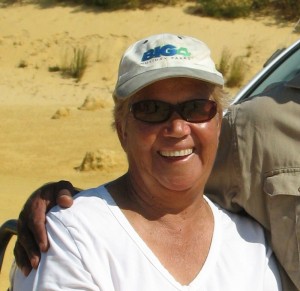Martha Borinelli nee Taylor talks about how the Government gathered Noongars together at New Norcia and Moore River Native Settlement during WWII

Martha Borinelli nee Taylor
Audio Recording
Audio Transcript
Martha Borinelli: But I think because in the Second World War when my parents were working at the farm, at Miling, and because Dad was in the army, but what happened, the army truck came around to all the farms and that around the area and picked up all the Aboriginal people and took them in trucks and put them down into New Norcia and Mogumber. And when Mum was pregnant they couldn’t take her to New Norcia so she had to go to Mogumber to give birth. So they picked up all the Aboriginal people in those areas during the Second World War and took ‘em down. So they weren’t – they had to be protected.
Rachel Cross: Don’t know why. I wonder why.
Martha Borinelli: They were to be protected in case the Japanese come.
Rachel Cross: Oh, right.
Martha Borinelli: So they wanted to, you know, pick them up and put ‘em in places where they could be protected. So they got all – they got all the Aboriginal people like Dad, all the army blokes, to be like standing guard, you know. And they had to go and patrol the coast area and all that and up north and that. That’s the story I was told by Mum.
Henry Cox: It is interesting, as you said earlier, that Jan Goodacre I know has been working on a book about Aboriginal people that served in the war for the country. It is interesting that as a group they were still, in spite of all of the oppression, were still generous enough to, you know, support the Australian population, the general population and the Australian government by joining up in the war effort.
Martha Borinelli: Yeah, yeah. You know, I’m really grateful really to Jan for what she did for me because I wouldn’t have known all this, you know. See that’s the certificate she gave me, you know, for Dad’s war. And his name when he was listed and when he was discharged and all that. And …
Henry Cox: I know she said that apparently there is … there are wages that haven’t been paid to Aboriginal soldiers either during the war.
Martha Borinelli: No, that’s … that’s exactly right because during the Second World War everybody, white people came back and they got a 99 year lease on land, when they came back from the Second World War. But Aboriginal people went to war and they fought and they died side by side with white men and when they came back, even the white men didn’t … even the white soldiers didn’t want to know them, see they had to drink in separate places, you know, like they had their own little bars because they’re black, you got to go over there. But they weren’t black to go and fight for their country. That’s what beats me, you know, and a lot of people died, a lot of Aboriginal men died. So, it wasn’t good, you know, it was terrible the way the government treated Aboriginal people, and it’s very hurtful, you know, and I think that it’s … we should do something about it because they got to be recognised.
From: Martha Borinelli, nee Taylor, interview for South West Aboriginal Land and Sea Council, 15 May 2007
Protocols
SWALSC followed cultural protocols to obtain permission to use this oral history on the website. It is also protected by copyright law and may only be used for private study, research, criticism or review. If you would like to use it for any commercial purposes, including publication, making copies for sale, or modifying it please contact SWALSC on reception@noongar.org.au or Level 2, 100 Royal Street, East Perth WA 6004.
Note: In some cases the written transcript has been edited with permission from the person interviewed and may differ slightly from the audio recording.
Permission to use this audio recording kindly granted by Carina Ward, Mark Borinelli, Sergio Borinelli and Andrew Borinelli